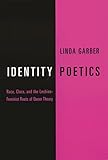Identity Poetics : Race, Class, and the Lesbian-Feminist Roots of Queer Theory / Linda Garber.
Material type: TextSeries: Between Men-Between Women: Lesbian and Gay StudiesPublisher: New York, NY : Columbia University Press, [2001]Copyright date: ©2001Description: 1 online resource (304 p.)Content type:
TextSeries: Between Men-Between Women: Lesbian and Gay StudiesPublisher: New York, NY : Columbia University Press, [2001]Copyright date: ©2001Description: 1 online resource (304 p.)Content type: - 9780231110327
- 9780231506724
- 306.7663
- online - DeGruyter
- Issued also in print.
| Item type | Current library | Call number | URL | Status | Notes | Barcode | |
|---|---|---|---|---|---|---|---|
 eBook
eBook
|
Biblioteca "Angelicum" Pont. Univ. S.Tommaso d'Aquino Nuvola online | online - DeGruyter (Browse shelf(Opens below)) | Online access | Not for loan (Accesso limitato) | Accesso per gli utenti autorizzati / Access for authorized users | (dgr)9780231506724 |
Frontmatter -- Contents -- Acknowledgments -- Introduction: Race, Class, And Generations -- Chapter One. The Social Construction of Lesbian Feminism -- Chapter Two. Putting the Word Dyke on the Map: Judy Grahn -- Chapter Three. "I Have a Dream Too": Pat Parker -- Chapter Four. "High Over Halfway Between Your World and Mine": Audre Lorde -- Chapter Five. An Uncommonly Queer Reading: Adrienne Rich -- Chapter Six. "Caught in the Crossfire Between Camps": Gloria Anzaldúa -- Chapter Seven. Around 1991: The Rise of Queer Theory and the Lesbian Intertext -- Afterward, the Dy2ke March: June 24, 2000, San Francisco -- Notes -- Works Cited -- Index
restricted access online access with authorization star
http://purl.org/coar/access_right/c_16ec
"Queer theory," asserts Linda Garber, "alternately buries and vilifies lesbian feminism, missing its valuable insights and ignoring its rich contributions." Rejecting the either/or choice between lesbianism and queer theory, she favors an inclusive approach that defies current factionalism. In an eloquent challenge to the privileging of queer theory in the academy, Garber calls for recognition of the historical-and intellectually significant-role of lesbian poets as theorists of lesbian identity and activism. The connections, Garber shows, are most clearly seen when looking at the pivotal work of working-class lesbians/lesbians of color whose articulations of multiple, simultaneous identity positions and activist politics both belong to lesbian feminism and presage queer theory. Identity Poetics includes a critical overview of recent historical writing about the women's and lesbian-feminist movements of the 1970s; discussions of the works of Judy Grahn, Pat Parker, Audre Lorde, Adrienne Rich, and Gloria Anzaldúa; and, finally, a chapter on the rise and hegemony of queer theory within lesbigay studies.
Issued also in print.
Mode of access: Internet via World Wide Web.
In English.
Description based on online resource; title from PDF title page (publisher's Web site, viewed 02. Mrz 2022)


